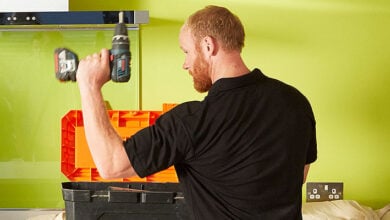Most of us will experience a leaky roof at some point in our lives. We all become familiar with the ominous drip, drip, drip coming from somewhere above, going to check it out only to discover the worst: water is seeping through the roof and discolouring our ceiling. The roof is leaking!
Luckily, there are steps you can take to mitigate the damage and avoid the worst-case scenario: a collapsed roof.
Has your roof got a leak? Find a local, vetted Rated People roofer.
How to limit the damage

Step one:
If there is a bulge in your ceiling and water is leaking through, grab a container – you can use anything that will hold the water, for example a bucket or even a bin, and place it under the leak.

This first step is important, as catching the drips will stop your wood, carpet, or belongings from suffering water damage.
The next step may seem counterintuitive but fear not – it could end up stopping your roof from caving in.
Step two:
Grab a screwdriver. Yes, I’m serious. Have a little faith! Take your screwdriver and locate the bulge in your ceiling where the water will be pooling on the other side. Find the centre of this bulge and make a hole in the ceiling.
Whilst warning signs might be going off in your head right about now – doing this could save your roof and stop it collapsing.
The hole you make will allow the water to flow easily into a bucket or bin, alleviating the pressure on your ceiling.
How to spot a leaky roof

The National Roofers Contractors Association advises you inspect your roof twice a year. Once in the spring and again come autumn.
Below are the warning signs of a leak you should look out for on the inside and outside of your roof.
On the inside:
- Sagging of the roof
- Dark patches
On the outside:
- Wear and tear around vents or chimneys
- Missing shingles on the roof
- Broken, rotting, blistering, or peeling of the roof
- Blocked gutters or downspouts
Need work completed in your home? Discover how to prepare your house.
The importance of acting fast

Yes, a leaky roof is common – and it won’t always lead to catastrophe right away. But there could be dire consequences to your home if you notice a leak and don’t act fast.
First off, it won’t fix itself and will only get worse over time. The moment you spot the warning signs: a stain on your ceiling, bubbling noises coming from your roof, or even water dripping, you should attend to these immediately and call for professional help if you’re unsure.
A standard flat roof typically lasts 10-15 years. Good news is, if your roof is a little younger it could be sorted with a spot-repair, saving you forking out for a whole new one.
However, often when one part goes the rest is soon to follow – so you still may want to consider getting a roofer in to replace your flat roof if a part of it is showing tell-tale signs of wear.
Call in the professionals

Once you’ve spotted the leak and have taken all the steps to limit the initial damage, it’s time to call in the professionals. This is the best way to ensure your roof is fixed in a timely, effective manner, before it causes extensive damage to your home. A professional roofer can also future proof your roof by making it watertight.
Some home insurance covers you for roof damage – so before seeking a professional check whether your roof is covered under your existing policy. If it’s not included, it may be worth looking into roof protection for the future.
For all your repair and home improvement needs, find Rated People tradesperson today.



